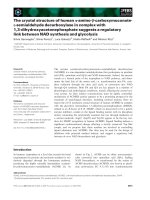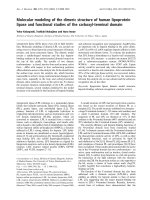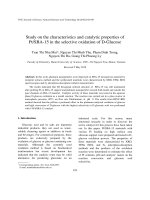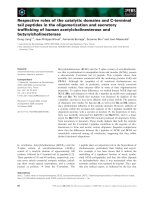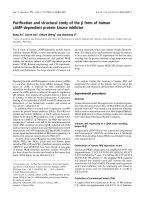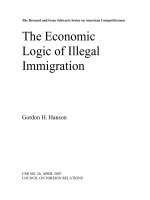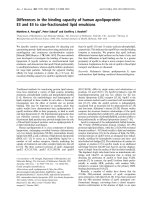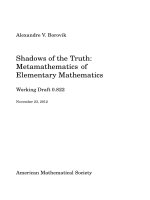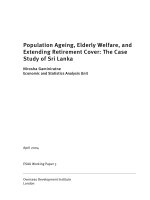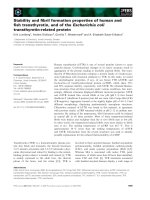Fair Trials: The European Criminal Procedural Tradition and the European Court of Human Rights potx
Bạn đang xem bản rút gọn của tài liệu. Xem và tải ngay bản đầy đủ của tài liệu tại đây (1.18 MB, 209 trang )
JOBNAME: Summers −− Fair Tria PAGE: 1 SESS: 31 OUTPUT: Wed Jul 18 09:13:57 2007
FAIR TRIALS
The right to a fair trial has become an issue of increasing public concern,
following a series of high profile cases such as the Bulger case, Khan (Sultan) and
R v DPP ex p Kebilene. In determining the scope of the right, we now increasingly
look to the ECHR, but the court has given little guidance, focusing on reconciling
procedural rules rather than addressing the broader issues. This book addresses
the issue of the meaning of the right by examining the contemporary jurispru-
dence in the light of a body of historical literature which discusses criminal
procedure in a European context. It argues that there is in fact a European
criminal procedural tradition which has been neglected in contemporary discus-
sions, and that an understanding of this tradition might illuminate the discussion
of fair trial in the contemporary jurisprudence.
This challenging new work elucidates the meaning of the fair trial, and in doing
so challenges the conventional approach to the analysis of criminal procedure as
based on the distinction between adversarial and inquisitorial procedural sys-
tems. The book is divided into two parts. The first part is dominated by an
examination of the fair trial principles in the works of several notable European
jurists of the nineteenth century, arguing that their writings were instrumental in
the development of the principles underlying the modern conception of criminal
proceedings. The second part looks at the fair trials jurisprudence of the ECHR,
and it is suggested that although the Court has neglected the European tradition,
the jurisprudence has nevertheless been influenced, albeit unconsciously, by the
institutional principles developed in the nineteenth century.
Volume 4 in the Criminal Law Library series
Columns Design Ltd / Job: Fair_Trials / Division: Summers_Prelims /Pg. Position: 1 / Date: 18/7
JOBNAME: Summers −− Fair Tria PAGE: 2 SESS: 30 OUTPUT: Wed Jul 18 09:13:57 2007
Criminal Law Library
Volume 1: Self-Defence in Criminal Law
Boaz Sangero
Volume 2: Evidence of Bad Character
John Spencer
Columns Design Ltd / Job: Fair_Trials / Division: Summers_Prelims /Pg. Position: 2 / Date: 17/7
JOBNAME: Summers −− Fair Tria PAGE: 3 SESS: 30 OUTPUT: Wed Jul 18 09:13:57 2007
Fair Tr ials
The European Criminal Procedural Tradition and
the European Court of Human Rights
SARAH J SUMMERS
Columns Design Ltd / Job: Fair_Trials / Division: Summers_Prelims /Pg. Position: 1 / Date: 17/7
JOBNAME: Summers −− Fair Tria PAGE: 4 SESS: 31 OUTPUT: Wed Jul 18 09:13:57 2007
Published in North America (US and Canada) by
Hart Publishing
c/o International Specialized Book Services
920 NE 58th Avenue, Suite 300
Portland, OR 97213-3786
USA
Tel: +1 503 287 3093 or toll-free: (1) 800 944 6190
Fax: +1 503 280 8832
E-mail:
Website: www.isbs.com
© Sarah J Summers 2007
Sarah J Summers has asserted her right under the Copyright, Designs and Patents Act
1988, to be identified as the author of this work.
All rights reserved. No part of this publication may be reproduced, stored in a retrieval
system, or transmitted, in any form or by any means, without the prior permission of
Hart Publishing, or as expressly permitted by law or under the terms agreed with the
appropriate reprographic rights organisation. Enquiries concerning reproduction which
may not be covered by the above should be addressed to Hart Publishing at the address
below.
Hart Publishing, 16C Worcester Place, OX1 2JW
Telephone: +44 (0)1865 517530 Fax: +44 (0)1865 510710
E-mail:
Website:
British Librar y Cataloguing in Publication Data
Data Available
ISBN 978-1-84113-730-8 (hardback)
Typeset by Columns Design Ltd, Caversham
Printed and bound in Great Britain by
TJ International Ltd, Padstow, Cornwall
Columns Design Ltd / Job: Fair_Trials / Division: Summers_Prelims /Pg. Position: 2 / Date: 18/7
JOBNAME: Summers −− Fair Tria PAGE: 5 SESS: 30 OUTPUT: Wed Jul 18 09:13:57 2007
For my family
and for Sari and his family
Columns Design Ltd / Job: Fair_Trials / Division: Summers_Prelims /Pg. Position: 3 / Date: 17/7
JOBNAME: Summers −− Fair Tria PAGE: 6 SESS: 30 OUTPUT: Wed Jul 18 09:13:57 2007
Columns Design Ltd / Job: Fair_Trials / Division: Summers_Prelims /Pg. Position: 4 / Date: 17/7
JOBNAME: Summers −− Fair Tria PAGE: 7 SESS: 31 OUTPUT: Wed Jul 18 09:13:57 2007
Acknowledgments
Many thanks
To Jim Murdoch for allowing me to participate in his award-winning ‘Euro-
pean Human Rights Project’ at the University of Glasgow and for his useful
insights on Chapters 4 and 5. To Christian Schwarzenegger for letting me
commandeer many books from his wonderful collection of historical works on
criminal law and procedure.
To Lindsay Farmer for suggesting that I consider writing a PhD, for his
continued support and encouragement even after I decided to write it in Zurich
rather than Glasgow and for his many helpful comments and criticisms. To Stefan
Trechsel for providing me with the perfect ‘day job’ and for his valuable
comments on the text, and to both Stefan and Franca for welcoming me to
Switzerland.
To Sararard Arquint for his readiness to discuss many of the ideas set out in
this book and to my family for everything.
Columns Design Ltd / Job: Fair_Trials / Division: Summers_Prelims /Pg. Position: 1 / Date: 18/7
JOBNAME: Summers −− Fair Tria PAGE: 8 SESS: 31 OUTPUT: Wed Jul 18 09:13:57 2007
This book is based on the author’s doctoral thesis written at the University of
Zurich under the co-supervision of Professor Lindsay Farmer (Glasgow) and
Professor Stefan Trechsel (Zurich). All translations are by the author, unless
otherwise stated.
Columns Design Ltd / Job: Fair_Trials / Division: Summers_Prelims /Pg. Position: 2 / Date: 18/7
JOBNAME: Summers −− Fair Tria PAGE: 1 SESS: 25 OUTPUT: Tue Jul 17 12:47:35 2007
Contents
Table of Cases xiii
Introduction xix
Part One
1 The Enduring Legacy of ‘Inquisitorial’ and ‘Accusatorial’
Procedural Forms in the Debate on Comparative Criminal
Procedure 3
A The Enduring Legacy of the Inquisitorial/Accusatorial Divide 3
B The Connection to Legal Nationalism 11
C Developing a New Approach for Analysing European
Criminal Procedure Law 14
2 The Origins of the European Criminal Procedural Tradition 21
A The Importance of the Developments of the Nineteenth
Century 21
B The Development of the ‘Accusatorial Trinity’ 24
C Judicial Impartiality 29
(i) The Separ ation of the Functions of ‘Judging’ and
‘Prosecuting’ in France and Germany 31
(ii) Impassivity or Activity: The Role of the English Judge in
the Examination of the Evidence 35
(iii) Institutional Impartialit y 38
D The Public Hearing Requirement 38
E Immediate and Oral Proceedings 47
(i) Immediate and Oral Examination of the Evidence at
Trial 50
(ii) Consideration at Trial of Evidence Collected Before the
Trial and Submitted in Writing 53
(iii) Immediate and Oral Proceedings as Fundamental to the
Accusatorial System 54
F Conclusions 58
3 The Rights of the Defence: Lessons from the Nineteenth Century 61
A The Institutional Nature of the ‘Rights of the Accused’ 61
B The Rights of the Defence at Trial 63
(i) The Presence of the Accused 63
(ii) Participatory Rights of the Accused 68
(iii) The Assistance of Counsel 78
C The Role of the Defence in the Pre-trial Phase 82
(i) The Pre-trial Phase as ‘Investigative’ 82
ix
Columns Design Ltd / Job: Fair_Trials / Division: citi-contents /Pg. Position: 1 / Date: 17/7
JOBNAME: Summers −− Fair Tria PAGE: 2 SESS: 26 OUTPUT: Tue Jul 17 13:04:38 2007
(ii) The ‘Determinative’ Reality of the Investigation 89
D Conclusions 92
Part Two
4 Defining Fairness in Ar ticle 6(1) ECHR 97
A Introduction 97
B Identifying Vargha’s ‘Accusatorial Trinity’ 99
C The Role of the ‘Equality of Arms’ Doctrine 103
D The Relationship Between the Adversarial Procedure
Requirement and the Equality of Arms 110
E The Court’s Interpretation of the Adversarial Procedure
Requirement in Criminal Proceedings 112
(i) The Right to be Present at Trial 113
(ii) Knowledge of the Other Side’s Submissions 118
(iii) Opportunity to Comment on the Other Side’s
Submissions 120
F The Relationship Between the Defence and the Prosecution 124
G Fairness and Implied Procedural Forms 126
5 The Structure of the ‘Trial’ in Article 6 ECHR 129
A Introduction 129
B The Defence’s Right to Challenge Witness Evidence 132
C Witness Evidence in Europe: An Overview 132
D Regulating Witness Evidence: Article 6(3)(d) 137
(i) What is an Adequate and Proper Opportunity to
Challenge Witnesses? 137
(ii) When Should Witnesses be Examined? 142
E The Importance of the Trial as a Forum for Confronting
Witness Evidence 146
F Reconciling Examination of Witnesses in the Investigation
Phase with the ‘Accusatorial Trinity’ 148
(i) The Presence of Counsel During Pre-trial Examination
of Witnesses 150
(ii) The Presence of an Impartial Supervisory Authority
During the Examination of Witnesses 151
(iii) Immediacy 154
G The Privilege Against Self-incrimination 155
(i) Improper Compulsion 156
(ii) Indirect ‘Acceptable’ Compulsion 157
(iii) The Relationship Between ‘Compulsion’ and the
Assistance of Counsel 160
(iv) The Privilege Against Self-incrimination as a Substitute
for the Refusal to Insist on Adversarial Principles in the
Investigation Phase 161
H The Root of the Problem: Defining the ‘Trial’ 163
(i) The Investigation Phase Lacuna 163
(ii) Explaining the Investigation Phase Lacuna: Les Travaux
Préparatoires? 164
x Contents
x
Columns Design Ltd / Job: Fair_Trials / Division: citi-contents /Pg. Position: 2 / Date: 17/7
JOBNAME: Summers −− Fair Tria PAGE: 3 SESS: 27 OUTPUT: Wed Jul 18 09:16:09 2007
(iii) Resolving the Fairness Deficit: Acknowledging the
European Procedural Tradition 166
6 Reassessing Fairness in European Criminal Law: Procedural
Fairness, Individual Rights and Institutional Forms 169
A Procedural Fairness as Individual Rights 169
B Procedural Rights and Institutional Forms 172
C Article 6 ECHR and the European Criminal Procedural
Tradition 178
D Towards an Institutional Understanding of Fairness in
Criminal Proceedings 183
Index 185
Contents xi
xi
Columns Design Ltd / Job: Fair_Trials / Division: citi-contents /Pg. Position: 3 / Date: 18/7
JOBNAME: Summers −− Fair Tria PAGE: 4 SESS: 23 OUTPUT: Tue Jul 17 12:02:29 2007
Columns Design Ltd / Job: Fair_Trials / Division: citi-contents /Pg. Position: 4 / Date: 17/7
JOBNAME: Summers −− Fair Tria PAGE: 1 SESS: 375 OUTPUT: Tue Jul 17 12:03:13 2007
Tables of Cases
Judgments of the European Court of Human Rights
Allan v United Kingdom no 48539/99 ECHR 2002-IX (2003) 36 EHRR 12 162
AM v Italy no 37019/97 ECHR 1999-IX 140
Apeh Üldözötteinek Szövetsége and Others v Hungary no 32367/96 ECHR 2000-X, 361
(2002) 34 EHRR 34 105, 122
Artico v Italy judgment of 13 May 1990 Series A no 37 (1981) 3 EHRR 1 149
Artner v Austria judgment of 28 August 1992 Series A no 242-A 140, 141
Asch v Austria judgment of 26 April 1991 Series A no 203 (1993) 15 EHRR 597 140
Atlan v United Kingdom no 36533/97 19 June 2001 (2002) 34 EHHR 33 119
Averill v United Kingdom no 36408/97 ECHR 2000-VI, 203 (2001) 31 EHRR 36 159
Axen v Ger many judgment of 8 December 1983 Series A no 72 (1984) 6 EHRR 195 98,
117
B v United Kingdom judgment of 8 July 1987 Series A no 121 (1988) 10 EHRR 87 117
B v United Kingdom and P v United Kingdom nos 36337/97 & 35974/97 judgment of 24
April 2001 (2002) 34 EHRR 19 98
Barberà, Messegué and Jabardo v Spain judgment of 6 December 1988 Series A no 146
(1989) 11 EHRR 360 102, 110, 116, 144, 145
Belziuk v Poland judgment of 25 March 1998 Reports 1998-II, 558 (2000) 30 EHRR
614 110, 111, 113, 116
Bende noun v France judgment of 24 February 1994 Series A no 284 (1994) 18 EHRR
54 105, 123
Birutis and others v Lithuania nos 47698/99 and 48115/99 judgment of 28 March
2002 140, 146
Bönisch v Austria judgment of 6 May 1985 Series A no 92 (1987) 9 EHRR 191 . 105, 125,
126
Borgers v Belgium judgment of 30 October 1991 Series A no 214 (1993) 15 EHRR
92 105, 108, 109, 110, 111, 122
Botten v Norway judgment of 19 February 1996 Reports 1996-I, 126 (2001) 32 EHRR
3 115, 116
Brandstetter v Austria judgment of 28 August 1991 Series A no 211 (1993) 15 EHRR
378 105, 110, 111, 125, 126
Brennen v United Kingdom no 39846/98 ECHR 2001-X, 211 (2002) 12 EHRR 217 181
Bulut v Austria judgment of 22 February 1996 Reports 1996-II, 346 (1997) 24 EHRR
84 105, 122
Cardot v France judgment of 19 March 1991 Series A no 200 (1991) 13 EHRR 853 145
Colozza v Italy judgment of 12 February 1985 Series A no 89 (1985) 7 EHRR 516 66,
113, 115, 116, 144
Condron v United Kingdom no 35718/97 ECHR 2000-V, 1 (2001) 31 EHRR 1 159, 162
Cooper v United Kingdom (GC) no 44843/99 judgment of 16 December 2003 (2004) 39
EHRR 8 100
Cuscani v United Kingdom no 32771/96 judgment of 24 September 2002 (2003) 36
EHRR 2 116
DeCubbervBelgiumjudgment of 26 October 1984 Series A no 86 (1985) 7 EHRR
236 101, 149, 152
Columns Design Ltd / Job: Fair_Trials / Division: Summers_Table_Cases /Pg. Position: 1 / Date: 17/7
JOBNAME: Summers −− Fair Tria PAGE: 2 SESS: 374 OUTPUT: Tue Jul 17 12:03:13 2007
De Jong, Baljet and van den Brink v Netherlands judgment of 22 May 1984 Series A no 77
(1986) 8 EHRR 20 153
Delcourt v Belgium judgment of 17 January 1970 Series A no 11 (1979–80) 1 EHRR
355 105, 107, 108, 109, 110, 153
Delta v France judgment of 19 December 1990 Series A no 191-A (1993) 16 EHRR
574 139, 140, 142
Dombo Beeher BV v Netherlands judgment of 27 October 1993 Series A no 274 (1994) 18
EHRR 213 105, 113
Doorson v Netherlands judgment of 26 March 1996 Reports 1996-II, 446 (1996) 22
EHRR 330 138, 139, 146
Duinhof and Duijf v Netherlands judgment of 22 May 1984 Series A no 79 (1991) 13
EHRR 478 153
Edwards v United Kingdom judgment of 16 February 1992 Series A no 247-B (1993) 15
EHRR 417 119, 120, 130, 133
Ekbatani v Sweden judgment of 26 May 1988 Series A no 134 (1991) 13 EHRR 504 114
Fayed v United Kingdom judgment of 21 September 1994 Series A no 294-B (1994) 18
EHRR 393 148, 162
FCB v Italy judgment of 28 August 1991 Series A no 208-B (1992) 14 EHRR 909 113
FejdevSwedenjudgment of 29 October 1991 Series A no 212-C (1994) 17 EHRR
14 115
Findlay v United Kingdom judgment of 25 February 1997 Reports 1997-I, 263 (1997) 24
EHRR 211 100
Fitt v United Kingdom no 29777/96 ECHR 2000-II (2000) 30 EHRR 480 105, 111, 118
Foucher v France judgment of 18 March 1997 Reports 1997-II, 452 (1998) 25 EHRR
234 105, 150
FR v Switzerland no 37292/97 judgment of 28 June 2001 105
Funke v France judgment of 25 February 1993 Series A no 256-A (1993) 16 EHRR
297 156
Goc v Turkey no 36590/97 judgment of 9 November 2000 (2002) 35 EHRR 6 111
Goddi v Italy judgment of 9 April 1984 Series A no 76 (1984) 6 EHRR 457 115, 116
Gregory v United Kingdom judgment of 25 February 1997 Reports 1997-I, 296 (1998) 25
EHRR 577 100
Hauschildt v Denmark judgment of 24 May 1989 Series A no 154 (1989) 12 EHRR
266 126
Heaney and McGuinness v Ireland no 34720/97 ECHR 2000-XII (2001) 33 EHRR 12. 156
HelmersvSwedenjudgment of 29 October 1991 Series A no 212-A (1993) 15 EHRR
285 114
Huber v Switzerland judgment of 23 October 1990 Series A no 188 153, 154
Hulki Günes v Turkey no 28490/95 ECHR 2003-VII, 187 (2006) 43 EHRR 15 140
IJL, GMR and AKP v United Kingdom nos 29522/95, 30056/96 and 30574/96 ECHR
2000-IX (2001) 33 EHRR 11 111, 148, 157, 162
Imbrioscia v Sw itzerland judgment of 24 November 1993 Series A no 275 (1994) 17
EHRR 441 164, 182
Isgrò v Italy judgment of 19 February 1991 Series A no 194-A 140, 150
Jasper v United Kingdom no 27052/95 judgment of 16 February 2000 (2000) 30 EHRR
441 105, 118
JB v Switzerland no 31827/96 ECHR 2001-III, 435 157
JJ v Netherlands judgment of 27 March 1998 Reports 1998-II, 603 (1999) 28 EHRR
168 111
John Murray v United Kingdom judgment of 8 February 1996 Reports 1996-I, 30 (1996)
22 EHRR 29 130, 151, 156, 158, 160, 161, 162, 181, 182
xiv Tables of Cases
Columns Design Ltd / Job: Fair_Trials / Division: Summers_Table_Cases /Pg. Position: 2 / Date: 9/7
JOBNAME: Summers −− Fair Tria PAGE: 3 SESS: 374 OUTPUT: Tue Jul 17 12:03:13 2007
Kamasinski v Austria judgment of 19 December 1989 Series A no 168 (1991) 13 EHRR
36 139
KDB v Netherlands judgment of 27 March 1998 Reports 1998-II, 620 (1999) 28 EHRR
168 111
Kostovski v Netherlands judgment of 20 November 1989 Series A no 166 (1990) 12
EHRR 140 137, 138, 144, 145, 154
Krcmar and others v Czech Republic no 35376/97 judgment of 3 March 2000 (2001) 31
EHRR 41 111, 112
Kremzow v Austria judgment of 21 September 1993 Series A no 268-B (1994) 17 EHRR
322 114
Kress v France no 39594/98 ECHR 2001-VI, 41 105, 122
Kuopila v Finland no 27752/95 judgment of 27 April 2000 (2001) 33 EHRR 25 105, 123
Kyprianou v Cyprus no 73797/01 judgment of 27 January 2004 100
Lobo Machado v Portugal judgment of 20 February 1996 Reports 1996-I, 195 (1997) 23
EHRR 79 111
Lucà v Italy no 33345/96 ECHR 2001-II, 167 (2003) EHRR 46 140
Lüdi v Switzerland judgment of 15 June 1992 Series A no 238 (1993) 15 EHRR 173 139
Magee v United Kingdom no 28135/95 ECHR 2000-VI, 159 (2001) 31 EHRR 35. 160, 161
Mantovanelli v France judgment of 18 March 1997 Reports 1997-II, 436 (1997) 24 EHRR
370 111, 112
Matznetter v Austria judgment of 10 November 1969 Series A no 10 (1979–80) 1 EHRR
198 104
McMicheal v United Kingdom judgment of 24 February 1995 Series A no 307-B (1995)
20 EHRR 205 105
Mialhe v France (no 2) judgment of 26 September 1996 Reports 1996-IV, 1319 (1997) 23
EHRR 491 105
Monnell and Morris v United Kingdom judgment of 2 March 1987 Series A no 115 (1988)
10 EHRR 205 104, 105, 114, 117
Morel v France no 34130/96 ECHR 2000-VI (2001) 33 EHRR 47 111
Morris v United Kingdom no 38784/97 judgment of 26 February 2002 (2002) 34 EHRR
52 100
Neumeister v Austria judgment of 27 June 1968 Series A no 8 (1979–80) 1 EHRR
91 104
Nideröst-Huber v Switzerland judgment of 18 February 1997 Reports 1997-I, 101 (1998)
25 EHRR 709 105, 111, 112
Öcalan v Turkey no 46221/99 judgment of 12 March 2003 (2003) 37 EHRR 10 151
Pakelli v Germany judgment of 25 April 1983 Series A no 64 (1984) 6 EHRR 1 117
Piersack v Belgium judgment of 1 October 1982 Series A no 53 (1983) 5 EHRR 169 99,
100
Pisano v Italy Application no 36732/97 judgment of 27 July 2000 (2002) 34 EHRR
27 130
Poitrimol v France judgment of 23 November 1993 Series A no 277-A (1994) 18 EHRR
130 66, 113, 114
Pretto and Others v Italy judgment of 8 December 1983 Series A no 71 (1984) 6 EHRR
182 98
PS v Germany no 33900/96 judgment of 20 December 2001 (2003) 36 EHRR 61 140
Quinn v Ireland no 36887/97 judgment of 21 December 2000 156
Reinhardt and Slimane-Kaïd v France judgment of 31 March 1998 Reports 1998-II, 640
(1999) 28 EHRR 59 120, 122
Remli v France judgement of 23 April 1996 Reports 1996-II, 559 (1996) 22 EHRR
253 100
Tables of Cases xv
Columns Design Ltd / Job: Fair_Trials / Division: Summers_Table_Cases /Pg. Position: 3 / Date: 9/7
JOBNAME: Summers −− Fair Tria PAGE: 4 SESS: 375 OUTPUT: Tue Jul 17 12:03:13 2007
Ringeisen v Austria judgment of 16 July 1971 Series A no 13 (1979–80) 1 EHRR
455 151
Rowe and Davis v United Kingdom no 28901/95 ECHR 2000-II (2000) 30 EHRR 1 105,
111, 118, 120
Ruiz-Mateos v Spain judgment of 23 June 1993 Series A no 262 (1993) 16 EHRR
505 105, 110, 111
Sadak and others v Turkey nos 29900/96, 29901/96, 29902/96, 29903/96 ECHR 2001-VIII,
267 (2003) 36 EHRR 26 140
Saïdi v France judgment of 20 September 1993 Series A no 261-C (1994) 17 EHRR
251 138, 139, 140, 146
Sanchez-Reisse v Switzerland judgment of 21 October 1986 Series A no 107 (1987) 9
EHRR 71 104, 110
Sarikaya v Turkey no 36115/97 judgment of 22 April 2004 181
Saunders v United Kingdom judgment of 17 December 1996 Reports 1996-VI, 2044
(1997) 23 EHRR 313 157, 162
Schenk v Switzerland judgment of 12 July 1988 Series A no 140 (1991) 13 EHRR
242 134
Schiesser v Switzerland judgment of 4 December 1979 Series A no 34 (1979–80) 2 EHRR
71 152, 153
Schuler-Zgraggen v Sw itzerland judgment of 24 June 1993 Series A 263 (1993) 16 EHRR
405 123
Solakov v FYROM no 47023/99 ECHR 2001-X, 29 140
Stanford v United Kingdom judgment of 23 February 1994 Series A no 282-A 113
Stefanelli v San Marino no 35396/97 ECHR 2000-II (2001) 33 EHRR 16 116
Sutter v Switzerland judgment of 22 February 1984 Series A no 74 (1984) 6 EHRR 272
114
Tierce and others v San Marino nos 24954/94, 24971/94 and 24972/94 ECHR 2001-IX
(2002) 34 EHRR 25 115
Unterpertinger v Austria judgment of 24 November 1986 Series A no 110 (1991) 13
EHRR 175 139, 143, 144, 145, 154
Van de Hurk v Netherlands judgment of 19 April 1994 Series A no 288 (1994) 18 EHRR
481 105
Van der Sluijs, ZuidervEld and Klappe v Netherlands judgment of 22 May 1984 Series A
no 78 (1991) 13 EHRR 461 153
Van Mechelen and others v Netherlands judgment of 23 April 1997 Reports 1997-III, 691
(1998) 25 EHRR 647 139, 140
VanOrshovenvBelgiumjudgment of 25 June 1997 Reports 1997-III, 1039 (1998) 26
EHRR 55 111
Vermeulen v Belgium judgment of 20 February 1996 Reports 1996-I, 224 (2001) 32
EHRR 15 105, 111
Visser v Netherlands no 26668/95 judgment of 14 February 2002 138, 146
Werner v Austria judgment of 24 November 1997 Reports 1997-VII, 2496 (1998) 26
EHRR 310 105
Windisch v Austria judgment of 27 September 1990 Series A no 186 (1991) 13 EHRR
281 139
Decisions and Reports of European Commission of Human Rights and European
Court of Human Rights
Austria v Italy (Pfunders case) Application no 788/60 report of 30 March 1963 (1963) 6
YB 740 116
Can v Austria Application no 9300/81 report of 12 July 1984 Series B no 79 102, 151
Crociani and others v Italy Application nos 8603/79, 8722/79, 8723/79 and 8729/79
(1980) 22 DR 147
xvi Tables of Cases
Columns Design Ltd / Job: Fair_Trials / Division: Summers_Table_Cases /Pg. Position: 4 / Date: 17/7
JOBNAME: Summers −− Fair Tria PAGE: 5 SESS: 374 OUTPUT: Tue Jul 17 12:03:13 2007
DC, HS and AD v United Kingdom Application no 39031/97 decision of 14 September
1999 157
Ensslin, B aader and Raspe v Germany Application nos 7572/76, 7586/76 and 7587/76
(1978) 14 DR 91 115
Kaufman v Belgium Application no 10938/84 (1986) 50 DR 110
Kristinsson v Iceland Report of 8 March 1989 attached to the judgment of 22 February
1990 Series A no 171-B 101
Mellors v United Kingdom Application no 57836/00, decision of 30 January 2003 155
Nielsen v Denmark Application no 343/57 report of 16 March 1961 (1961) 4 YB
494 103, 134
Ofner and Hopfinger v Austria Application nos 524/59 and 617/59 report of 23
November 1962 (1963) 6 YB 680 104,106
Pataki and Dunshirn v Austria Application nos 596/59 and 789/60 report of 28 March
1963 (1963) 6 YB 718 104,106
PK v Finland Application no 37442/97 decision of 9 July 2002 130, 155
WGS and MLS v United Kingdom Application no 38172/97 decision of 23 November
1999 157
X v Austria Application no 2645/65 (1969) 28 CD 43 115
X v Austria Application no 2676/65 decision of 3 April 1967 (1967) 23 CD 31 115
XvBelgiumApplication no 7450/76 decision of 28 February 1977 (1977) 9 DR 108
133
XvBelgiumApplication no 8876/80 decision of 16 October 1980 (1980) 23 DR 235
133, 134
X v Germany Application no 1169/61 (1964) 13 CD 1 115
X v Germany Application no 6541/74 decision of 9 July 1975 (1975) 3 DR 86
XvNorwayApplication no 5923/72 decision of 30 May 1975 (1975) 3 DR 43 115, 117
X v United Kingdom Application no 6172/73 decision of 7 July 1975 (1975) 3 DR
77 134
Tables of Cases xvii
Columns Design Ltd / Job: Fair_Trials / Division: Summers_Table_Cases /Pg. Position: 5 / Date: 9/7
JOBNAME: Summers −− Fair Tria PAGE: 6 SESS: 374 OUTPUT: Tue Jul 17 12:03:13 2007
Columns Design Ltd / Job: Fair_Trials / Division: Summers_Table_Cases /Pg. Position: 6 / Date: 9/7
JOBNAME: Summers −− Fair Tria PAGE: 1 SESS: 46 OUTPUT: Tue Jul 17 12:49:29 2007
Introduction
A
RTICLE 6 OF THE European Convention on Human Rights has become
the defining standard within Europe for determining the fairness of
criminal proceedings. Its success has been attributed to the fact that it is
not based on a particular model of criminal procedure. In this regard it is no
coincidence that much of the literature on comparative criminal procedure law
continues to adhere to an understanding of European criminal procedural
systems as divided into two groups: the accusatorial and the inquisitorial. In Part
One, this understanding of European criminal proceedings is challenged by an
examination of the work of various important European jurists of the nineteenth
century. It is argued that their writings on the nature and form of criminal
proceedings were instrumental in the developing conception of the principles
which underlie the modern conception of criminal proceedings. Further it is
claimed that on the basis of their work it is possible to identify a common
European conception of criminal proceedings.
In Part Two, the fair trials jurisprudence of the European Court of Human
Rights is analysed in order to determine whether it can be said to be following the
European criminal procedural tradition. It is suggested that although the Euro-
pean tradition has been neglected by the Court, the jurisprudence has neverthe-
less been influenced, albeit unconsciously, by the institutional principles
developed in the nineteenth century. Only through letting go of the accusatorial–
inquisitorial typology and devoting more consideration to the European proce-
dural tradition will it be possible, however, for the Court to develop a more
coherent and consistent vision of the rights set out in Article 6.
Finally the implications associated with construing fairness principally in
terms of individual rights are assessed. Not only is this at odds with the European
procedural tradition, it also excludes broader consideration of procedural fair-
ness in the context of the criminal justice system. The rights-based approach has
contributed to the failure to come to terms with the implications of the
separation of cr iminal proceedings into the investigative phase and the determi-
native trial. In one crucial sense, this means that there has been little progress in
the development of our understanding of criminal proceedings since the nine-
teenth century. The fairness of the trial continues to be the primary means of
legitimising the criminal process, but the trial is nevertheless heavily dependent
on the under-regulated investigation to ensure the effectiveness of the system of
xix
Columns Design Ltd / Job: Fair_Trials / Division: Introduction /Pg. Position: 1 / Date: 17/7
JOBNAME: Summers −− Fair Tria PAGE: 2 SESS: 46 OUTPUT: Tue Jul 17 12:49:29 2007
prosecutions. A more coherent understanding of fairness requires recognition of
the reliance of the role of the defence (and therefore the rights of the accused) on
the institutional structure of the proceedings.
Introduction
xx
Columns Design Ltd / Job: Fair_Trials / Division: Introduction /Pg. Position: 2 / Date: 17/7
JOBNAME: Summers −− Fair Tria PAGE: 1 SESS: 42 OUTPUT: Tue Jul 17 12:08:21 2007
Part One
Columns Design Ltd / Job: Fair_Trials / Division: 6_Chapter_1 /Pg. Position: 1 / Date: 8/3
JOBNAME: Summers −− Fair Tria PAGE: 2 SESS: 42 OUTPUT: Tue Jul 17 12:08:21 2007
Columns Design Ltd / Job: Fair_Trials / Division: 6_Chapter_1 /Pg. Position: 2 / Date: 8/3
JOBNAME: Summers −− Fair Tria PAGE: 3 SESS: 42 OUTPUT: Tue Jul 17 12:08:21 2007
1
The Enduring Legacy of
‘Inquisitorial’ and ‘Accusatorial’
Procedural Forms in the Debate on
Comparative Criminal Procedure
A The Endur ing Legacy of the
Inquisitorial/Accusatorial Divide
I
T M AY BE uncontroversial to suggest that European criminal procedure law
has, in the last 20 years, enjoyed something of a renaissance. It may be less
controversial still to attribute this, at least in part, to the considerable case law
amassed by the European Court (the Court) and Commission of Human Rights
in their interpretation and application of Articles 5 and 6 of the European
Convention on Human Rights (ECHR). But acceptance of this consensus would
be to ignore the inherent tension in the phrase ‘European criminal procedure
law’. While the Strasbourg case law has undoubtedly influenced the procedural
laws of the member states, it has done little to reconcile these or to situate them
within some kind of European criminal procedural tradition.
The renewed interest in the regulation of the application of the substantive law
cannot be said to have contributed much to the examination of the essence and
form of procedural law and procedural rights. Instead, the debate on systems of
criminal procedure and on the nature of procedural rights has been dominated
by simplistic comparative examinations. Rather than addressing normative con-
cerns such as how procedural systems should look or the role that procedural
rights should play, the comparative criminal procedure law scholarship has been
preoccupied with the descriptive classification of systems. This has not only
served to cast doubt on the merits of comparative criminal procedure law as a
3
Columns Design Ltd / Job: Fair_Trials / Division: 6_Chapter_1 /Pg. Position: 1 / Date: 8/3
JOBNAME: Summers −− Fair Tria PAGE: 4 SESS: 42 OUTPUT: Tue Jul 17 12:08:21 2007
legitimate discipline,
1
but has also meant that the emerging case law and
principles of the ECHR in the field of criminal procedure have not been properly
evaluated.
Much of the literature on comparative criminal procedure rests on underlying
assumptions which are seldom tested, but which nevertheless exert considerable
influence on the conclusions reached. Undoubtedly the most familiar and domi-
nant of these is the belief that there are ‘two main approaches to criminal
procedure in most of the world: the inquisitorial and the accusatorial’.
2
It is
highly unusual for any work that aims to describe, define or compare criminal
procedure to eschew reference to these terms.
3
According to Jörg, Field and
Brants, the criminal justice systems of England and Wales and the Netherlands
are ‘typical examples of adversarial and inquisitorial systems, respectively’.
4
‘The
English and American systems are adversarial; in contrast, Continental European
systems, like the French and Italian, are inquisitorial’, writes Carey,
5
while Malsch
and Freckelton contrast ‘adversarial, or party-centred systems—such as those in
the United States, the United Kingdom and Australia—and the court-centred or
inquisitorial systems—such as that which exists in the Netherlands’.
6
Fairchild
and Dammer are content to lump together ‘France, German, China and even, in
some respects, Japan’ as examples of ‘inquisitorial systems’,
7
while Van Kessel
simply refers to ‘today’s Continental inquiry systems of criminal justice’.
8
The
adversarial–inquisitorial typology is by no means restricted to the English
1
P Roberts, ‘On Method: The Ascent of Comparative Criminal Justice’ (2002) 22 Oxford Journal of
Legal Studies 539 at 539–41. For an analysis of the problems of the comparative methodology more
generally see P Legrand, ‘Public Law, Europeanisation and Convergence: Can Comparativists Con-
tribute?’ in P Beaumont, C Lyons and N Walker (eds), Convergence and Divergence in European Public
Law (Oxford, Hart Publishing, 2002).
2
CM Bradley, ‘The Convergence of the Continental and the Common Law Model of Criminal
Procedure’ (1996) 7 Criminal Law Forum 471 at 471.
3
See JD Jackson, ‘The Effect of Human Rights on Criminal Evidentiary Processes: Towards
Convergence, Divergence or Realignment’ (2005) 68 MLR 737 at 740.
4
N Jörg, S Field and C Brants, ‘Are Inquisitorial and Adversarial Systems Converging?’ in C
Harding, P Fennel, N Jörg and B Swart (eds), Criminal Justice in Europe: A Comparative Study
(Oxford, Clarendon Press, 1995).
5
J Carey, ‘Charles Laughton, Marlene Dietrich and the Prior Inconsistent Statement’ (2005) 36
Loyola University of Chicago Law Journal 433 at 441.
6
M Malsch and I Freckelton, ‘Expert Bias and Partisanship: A Comparison between Australia and
the Netherlands’ (2005) 11 Psychology, Public Policy and Law 42 at 42.
7
E Fairchild and HR Dammer, Comparative Criminal Justice Systems (Belmont, Cal, Wadsworth
Publishing, 2001) at 146. Several American commentators regard Ger many as paradigmatic of the
inquisitorial tradition: see eg RK Chr istensen, ‘Getting to Peace by Reconciling Notions of Justice: The
Importance of Considering Discrepancies Between Civil and Common Legal Systems in the Forma-
tion of the International Criminal Court’ (2001) 6 UCLA Journal of International Law and Foreign
Affairs 391 at 403; J Kokott, The Burden of Proof in Comparative and International Human Rights Law:
Civil and Common Law Approaches with Special Reference to the American and German Legal Systems
(The Hague, Kluwer Law, 1998).
8
G van Kessel, ‘European Perspectives on the Accused as a Source of Testimonial Evidence’ (1998)
100 West Virginia Law Review 799 at 799.
The Legacy of Procedural Forms in the Debate
4
Columns Design Ltd / Job: Fair_Trials / Division: 6_Chapter_1 /Pg. Position: 2 / Date: 8/3
